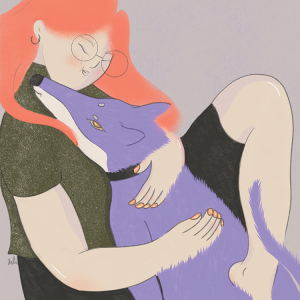Thanks to Evolution, Your Dog Understands Your Emotions
Per a new study, pups show signs of stress when humans cry—but not all animals do.

Share Article
Anyone who has gotten a few extra snuggles from their pup while feeling down could tell you that dogs seem to be able to pick up on our mental states. The science backs it up, too: Previous studies have found that dogs are more likely to approach a crying strangeropens in new tab than their own guardian and dogs’ cortisol levels riseopens in new tab after hearing human infants cry.
But until now, most of the established research has focused on dogs in isolation, without comparing them to other animals. A new studyopens in new tab published in Animal Behaviour found that dogs react to the sounds of humans crying in ways that are distinct from other animals, showing that pups may have evolved to understand human emotions during the domestication process.
The study
Researchers recruited pet dogs and pet pigs from seven countries; in the end, 30 dogs and 22 pigs were studied. They chose to use domesticated pigs and dogs so they could compare two different animals raised with humans — that way, they could determine if dogs simply learn human emotion during their lives through proximity to people, or if there is a genetic component.
Researchers tested each animal twice. Once, they played the animals a recording of a human crying; the other time, they played a recording of a human humming. The researchers found that dogs showed signs of stress — including shaking and whining — more often when they heard a human crying. They also physically touched their pet parents more often when they heard the sounds of crying. Regardless of the stimulus type, dogs more quickly looked at and approached their pet parent than pigs did.

On the other hand, pigs seemed to find humming more stressful. They showed signs of stress, such as rapid ear flicking, more often when they heard humming than when they heard than crying. “This suggests that pigs did not match their emotional state with the human sounds they heard,” wrote Fanni Lehoczki, the study’s lead author.
These stress responses show that, rather than being a learned behavior, understanding human emotion may be a result of evolution during the domestication process — which pigs, animals that have traditionally been kept as livestock by humans, haven’t undergone yet.
Researchers add, though, that pigs are highly sensitive (we’ve all seen Babe), and we shouldn’t use these results to count them out. It’s possible that pigs were simply confused by the humming sound and unable to understand its emotional significance (or lack of) — but that doesn’t necessarily mean they aren’t equally caring creatures.
“We don’t say that pigs can’t do [emotional contagion],” Paula Pérez Fraga, the study’s co-author, told Nature. “The story is really about how good dogs were; not how bad pigs were.”
References:

Sio Hornbuckle
Sio Hornbuckle is the Assistant Editor at Kinship, where they frequently write for the site. As a writer, they specialize in pet news, animal science, and pop culture. They live in New York City with their cat, Toni Collette.
Related articles
![]()
To Cry Is Human—and Apparently Canine
Time to whip out The Notebook for a little doggie movie night.
![Man hugging his fluffy white dog happily]()
Chemistry Between People and Dogs Is Real (It’s Science)
How the “love hormone” oxytocin connects us with our pups.
![Valentin Pujadas illustration]()
FYI, Pets Are Incredibly Good For Your Mental Health
Experts share the science-backed ways our pets offer us emotional support.
How to Tell If Your Dog Is a Hugger—Or Not
Boundaries, folks. Boundaries.
![Young woman looking at cellphone with her dog]()
Does Your Dog Understand When You FaceTime Them?
It’s a nice thought.
Why Does My Dog Lick Me? The Meaning Behind Dogs Licking Us
The sentiment is nice, but...







